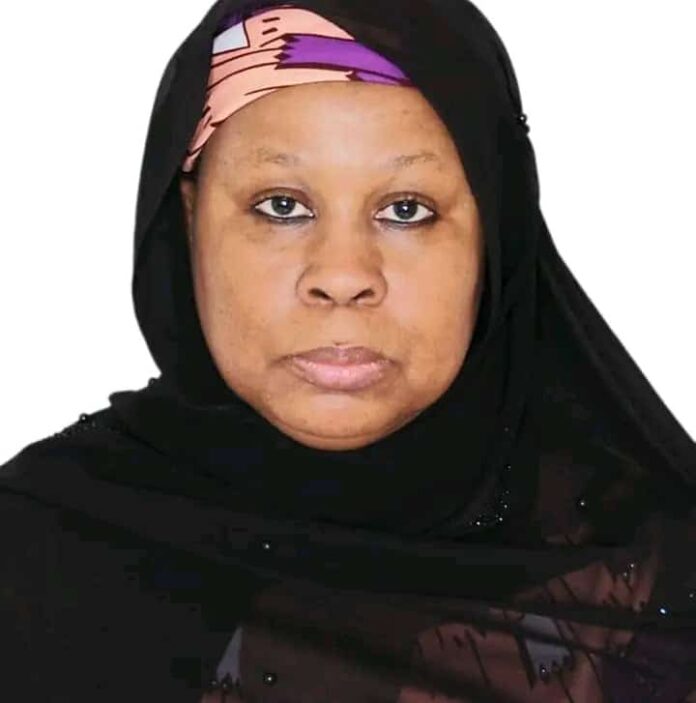Prof. Fatima Ja’afar Tahir is Bauchi State’s second female but first female professor of microbiology, first female professor in Bauchi Local Government and first female professor in the state produced by the Abubakar Tafawa Balewa University (ATBU) Bauchi.
In this exclusive interview with Neptune Prime’s Bilal Sani, she narrates her success story, how she overcame challenges to become a professor even though she is a married woman and her advice to parents and husbands to support women in their pursuit of education.
Excerpts:
NP: Can you give us a brief about yourself?
Prof: Well, my name is Fatima Ja’afar Tahir, I was born on 8th February 1966. In brief, I did all my education in Bauchi: Primary, Secondary and Tertiary. So sometimes I refer to myself as ‘Made in Bauchi’. My tertiary education was done in ATBU Bauchi; my first degree, Masters and Phd. And my entire professional career was also done in ATBU, Bauchi. I started as a Graduate Assistant and rose to the level of Professor in Micro-Biology. And I am married with children. So briefly this is what I can tell you about myself.
NP: But when did you start your working career?
Prof: I started in 1991 as a Graduate Assistant and moved to the rank of Assistant Lecturer in 1994 after my Masters. Thereafter I got the usual promotions every year to Lecturer II, Lecturer I, and Senior Lecturer and in 2009, I became a Professor.
NP: Recently you were honoured by an Association as the first female Professor in Bauchi Local Government, how did you feel?
Prof: Honestly I must say that I was very happy with the occasion and I also liked the wisdom the Association had in organizing the occasion because it brought a lot of people together, people that we had done primary and secondary schools together. For a long time some of them we have not seen but that occasion brought us together. Not only that, the occasion brought together a lot of my colleagues, and a lot of my contemporaries within and outside the state. It was actually a great occasion for me, for my local government as well as for my family. I felt greatly honoured by that.
NP: Did you encounter any challenges in your pursuit of education, especially as a woman, if yes what were the challenges?
Prof: There is no woman that can tell you that she did not encounter challenges as she pursues education, the only thing is that possibly the severity will differ from one woman to the other. But it is not more than the just usual obstacle. You are studying, you have to be at home, and you find that these are the three activities that you have to cope with and at the same time pursue your studies. Sometimes you find that you will have a test and then maybe one of your children is sick and you will take him to the hospital or maybe you are pregnant and you have to go for anti-natals.
So there are these challenges we face. But they are not problems. And I believe that if one is determined, they are things that you can easily overcome. And alhamdulillah I can say that a lot of women not just myself are doing that. So like we have said, there are challenges but are not insurmountable as to deter one from pursuing one’s ambition.
NP: In the northern part of the country, many Muslim women especially those who are married hardly attend tertiary institutions to acquire more education, but you have today got the most prestigious title one can get in Academia, how do you cope with the religious and societal norms?
Prof: [Laughs] Well, you see if you understand our religious norms correctly, there is nowhere that says a woman should not pursue education. At least we know that the first revelation to the prophet (SAW) is to read and he has also told us to seek for knowledge even if it means going as far as China. Right? So there is no religious norm that has put a barrier to a woman’s education.
And even society is changing now and it is our responsibility to try and see that we have changed it. We are role models and if we can do it what we are telling other women is that they can also do it. Now if you go to our universities, you will see a lot of northern girls, most of them will start at the 100 level before they get to the 200 level some of them are already married. So we are now trying not to change the societal norms but trying to see how we can inculcate the idea of accepting the fact that the world has changed.
NP: It seems there is a low level of education among women in Bauchi and the north at large, what do you think are the reasons why northern women lag behind in terms of education compared to what we see in the other regions?
Prof: Actually it is not true that northern women lag behind in education because if you go out to places, you will find that the number of women out of school is almost equivalent to the number of women that are out of school in the other parts of the country. But the only thing is that most of them there don’t rely on just western education, they expose themselves to other things. But here we just think that you have to go to school for you to be able to do some other things. If you see businesswomen in the southern part of the country, you will think they have gone to school. Most of them have not gone anywhere but because they are exposed, they do a lot of things and they pick English from here and there. So, if you see them you will think they have gone to school. Though I am not saying that the level of literacy is the same throughout the country but at the same time I don’t think we are, as people are thinking, too far behind. There are a lot of us (women) here that I can tell you have gotten at least some level of education like a Diploma. We don’t count the level, what we want to know is that what have you at least obtained?
NP: You are a mother and a university lecturer, how do you discharge your family and academic roles at the same time?
Prof: [Laughs] Well, they say women are good at multi-tasks. Whatever you do, you just require good planning. You already know your schedules in school and you know your responsibilities at home. So what you need to do is to plan how to meet your responsibilities at home and at the same time meet your school schedules. For example, if I know I have an 8 o’clock class, in between that time I will come home, do whatever it is that I want to do at home and if I have another class, I go back. So you see that is one good thing about lecturing because you have flexibility in time. Even if you have schedules at home that are going to clash with your schedules in school, you can reschedule your class and meet up with it after you have attended to your family’s needs. So, it is just a matter of planning.
NP: Having said this, are you saying that marriage cannot stop a woman from acquiring further education and what call do you have for husbands?
Prof: I have already said marriage cannot stop women from pursuing their education. Sometimes when I am reading articles or listening to presentations and I hear early marriage as a barrier to education, I always laugh because marriage can never be a barrier to education except if the person [woman] is not determined to pursue that education. What do I have to say to husbands is that give your wives whatever support they need and also understand the fact that they have to get whatever it is that they require in life just like you. And the requirement is such that she will need to be away from the house in order to be in school, I think it is the responsibility of the husband to give her all the necessary support and understanding.
NP: Some women in the country especially the educated ones are clamouring for active participation of women in politics and governance, would you like to join politics?
Prof: [Laughs] I am not a politician, I have no interest in politics. I have never been interested in politics. And I have never associated myself with anything politics. So, the only thing I can say is that I am giving kudos to those [women] who feel that they want to participate. Let them go out, offer what they have to offer and contribute to the development of the nation.
NP: Finally what message do you have for parents to enrol their female children into school and the women themselves?
Prof: Well, to the parents I think a lot of them are already enlightened. They have seen the wisdom of sending their girls to school. Because if not for anything at least they have seen how it helps. When a woman is educated she tries to help her family, I am sure you will be impressed. Because of that, I will advise parents to allow their female children to go to school. Because giving them Islamic education alone will not help them, they need some level of exposure to western education. By the time they combine them, they will be better mothers and they will also be better wives. Then to the women, giving the opportunity to pursue education should not be an opportunity for you to be irresponsible. Let us be up to our responsibility in the home. Once you are given that opportunity it is a great responsibility on you too and it’s left for you to protect your integrity.
Follow the Neptune Prime channel on WhatsApp:
Do you have breaking news, interview request, opinion, suggestion, or want your event covered? Email us at neptuneprime2233@gmail.com





